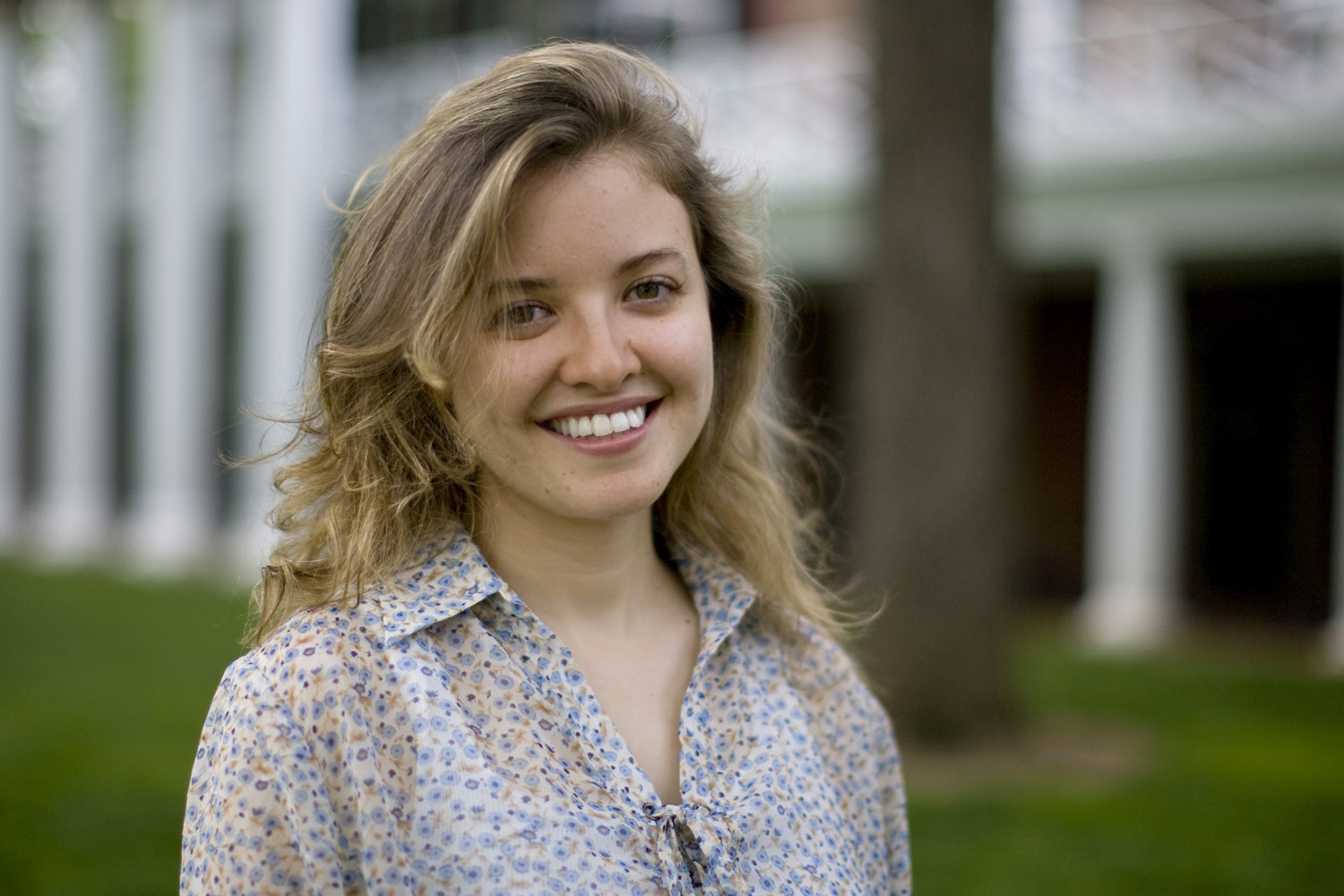May 11, 2011 — When Hebah Fisher arrived on the Grounds of the University of Virginia four years ago, her role model was Federal Reserve Chairman Ben Bernanke.
"I had my whole life planned out. I was going to study economics and international affairs and I wanted to be the next Ben Bernanke," she said over coffee on a recent Wednesday. "But I don't want to be him anymore."
As she prepares to graduate May 22 from the College of Arts & Sciences with a degree in global development studies, her new hero is Nobel Peace Prize laureate and microfinance champion Muhammad Yunus.
Her transformation began in her second year, when Fischer – a natural internationalist who was born in Washington, D.C., to Egyptian and American parents, lived in Saudi Arabia and attended high school in Bahrain – went to her first Social Entrepreneurs for Economic Development meeting at the invitation of a friend.
SEED was established in 2008. Its members are committed to fostering sustainable development in communities around the world through social entrepreneurship, an increasingly popular movement that identifies and solves social problems on a large scale.
Fisher became enthralled with the work SEED was doing. "One of the projects that stood out was they were going to build a credit rating system for working with microfinance clients. They would determine how reliable or risky the borrower was to lend to," Fisher said.
She could not believe what she was hearing. "These were things I was only reading about, not what students like me are working on," she said. "I was completely inspired."
After that first meeting, she jumped in with both feet, joining SEED and participating in a project called Leadership Initiatives, a non-governmental organization based in Nigeria and the Philippines that helps high school students in those countries find employment after graduation. "As an NGO, they are always struggling to manage their finances, so our team wrote grant proposals for them," she said. The group has remained a SEED client for three years and is doing well.
SEED has also had success locally, working with the Hope Community Center, which offers such programs as English as a Second Language and day care to homeless and refugee populations.
"We did a business plan for how to start a catering company that employs the homeless," Fisher said. "Hope started the catering company and we had them cater one of our events."
Unfortunately the business was not sustainable, Fisher said, because the mostly volunteer center lacked the resources to continue.
Still, she said doing this kind of work is highly valuable for U.Va. students. "They are learning about a place they have never been to, perhaps. Or, if it's here in Charlottesville, they are seeing a different side of it. They are learning something they never would have before."
Fisher became the president of SEED this year and set about finding ways to make this type of experience available to both faculty and students across Grounds. Buoyed by the support and encouragement of Gowher Rizvi, U.Va.'s vice provost for international programs, she and her team won a $25,000 Jefferson Trust Grant. It was accompanied by a $25,000 challenge grant which will be dispersed if SEED can raise $25,000 within 18 months. The trust also provided $5,000 dollars to assist SEED in its fundraising efforts.
Rizvi called Fisher an incredible student and person. "Hebah has been a great inspiration to all of us in the U.Va. community, striving to make the world a better place, always ready to walk the extra mile and constantly pushing at new frontiers in pursuit of her vision of a world free from want and injustice," he said. "She is truly an ideal Jeffersonian scholar.'
SEED will partner with Ashoka, the global association of the world's leading social entrepreneurs, to bring social entrepreneurship education and opportunities to Grounds. Ashoka offers several support services Fischer said SEED will purchase with its grant money.
"One idea is to do a retreat with a bunch of professors where, say, an English professor learns how to teach social entrepreneurship to his students," she said. "We also want to have a career services center where students can create connections with a bunch of great businesses."
SEED's ultimate goal is to create a University-wide Center for Social Entrepreneurship that would host conferences and bring in speakers. "We want to have ethics case competitions, social business venture competitions, and we want to be able to connect students with employment opportunities," she said.
SEED members will also teach a class in the fall on social entrepreneurship through the Cavalier Education Program, which allows students to create and teach courses to their peers. "It's kind of a primer. We hope to create a minor or a track in social entrepreneurship and have it available across disciplines so anyone can take the classes," said Fisher, who is still deciding what she will do after graduation.
She said there is a real need to bring social entrepreneurship into all of U.Va.'s classrooms. "Because everything that we know about it, we have had to teach ourselves. Why isn't it offered at U.Va? We really think this is the future. This is how you change the world."
Media Contact
Article Information
May 11, 2011
/content/social-entrepreneurship-how-you-change-world-graduate-says

